Most are skeptical of considering race and ethnicity in college admissions
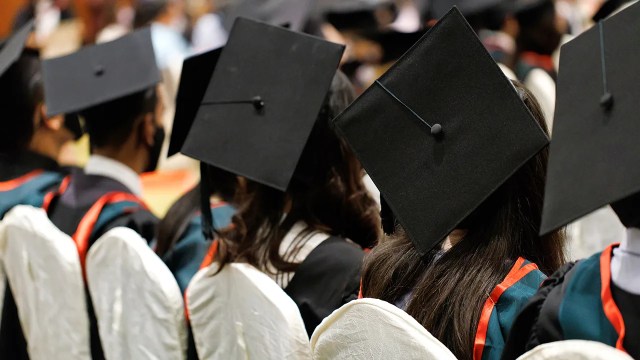
Pew Research Center conducted this analysis to understand the views of Asian Americans toward affirmative action. This in-depth analysis uses data from a nationally representative survey of Asian American adults, two nationally representative surveys of U.S. adults, and a qualitative study of Asian Americans. The analysis is the latest in the Center’s series of in-depth analyses of public opinion among Asian Americans.
The first is a nationally representative survey of 7,006 self-identified Asian adults conducted online and by mail from July 5, 2022, to Jan. 27, 2023. Asian respondents include those who identified as more than one race or as Hispanic. Here is the methodology used for the survey of Asian Americans.
The second is a nationally representative online survey of 5,132 U.S. adults that includes 367 English-speaking, single-race, non-Hispanic Asians conducted on the Center’s American Trends Panel from Dec. 5 to 11, 2022.
Identical questions about affirmative action generally and the use of high school grades, standardized test scores, athletic ability, family income, gender and race and ethnicity in college admissions decisions were asked on the 2022-23 survey of Asian American adults and the December 2022 survey of all U.S. adults. This allows for a comparison of Asian American adults’ views with those of other groups of Americans.
The third survey is another nationally representative online survey of 5,079 U.S. adults conducted on the Center’s American Trends Panel from March 27 to April 2, 2023. It includes 368 English-speaking, single-race, non-Hispanic Asians.
For survey questions from all three surveys used in this analysis, see the topline questionnaire.
Survey results were complemented by 66 focus groups of Asian adults conducted before the 2022-2023 survey of Asian Americans, from Aug. 4 to Oct. 14, 2021. The groups were made up of 264 recruited participants from 18 Asian origin groups. Focus group discussions were conducted in 18 languages and moderated by members of their origin groups.
Pew Research Center is a subsidiary of The Pew Charitable Trusts, its primary funder. The Center’s Asian American portfolio was funded by The Pew Charitable Trusts, with generous support from The Asian American Foundation; Chan Zuckerberg Initiative DAF, an advised fund of the Silicon Valley Community Foundation; the Robert Wood Johnson Foundation; the Henry Luce Foundation; the Doris Duke Foundation; The Wallace H. Coulter Foundation; The Dirk and Charlene Kabcenell Foundation; The Long Family Foundation; Lu-Hebert Fund; Gee Family Foundation; Joseph Cotchett; the Julian Abdey and Sabrina Moyle Charitable Fund; and Nanci Nishimura.
We would also like to thank the Leaders Forum for its thought leadership and valuable assistance in helping make this survey possible.
The strategic communications campaign used to promote the research was made possible with generous support from the Doris Duke Foundation.
The terms Asian and Asian American are used interchangeably throughout this report to refer to U.S. adults who self-identify as Asian, either alone or in combination with other races or Hispanic identity.
Ethnicity and ethnic origin labels, such as Chinese and Chinese origin, are used interchangeably in this report for findings for ethnic origin groups, such as Chinese, Filipino, Indian, Japanese, Korean or Vietnamese. For this report, ethnicity is not nationality. For example, Chinese in this report are those self-identifying as being of Chinese ethnicity, rather than necessarily being a current or former citizen of the People’s Republic of China. Ethnic origin groups in this report include those who self-identify as one Asian ethnicity only, either alone or in combination with a non-Asian race or ethnicity.
The term Asian origin groups is used throughout this report to describe ethnic origin groups.
Immigrants in this report are people who were not U.S. citizens at birth – in other words, those born outside the U.S., Puerto Rico or other U.S. territories to parents who are not U.S. citizens. The terms immigrant and foreign born are used interchangeably to refer to this group.
U.S. born refers to people born in the 50 U.S. states or the District of Columbia, Puerto Rico or other U.S. territories.
As the U.S. Supreme Court prepares to decide whether colleges can continue to consider race and ethnicity in admissions, a new national survey of Asian adults finds that Asian Americans have mixed views of affirmative action and related issues.
On one hand, about half of Asian adults who have heard of affirmative action (53%) say it is a good thing, while 19% say it is a bad thing, and 27% say they don’t know whether affirmative action is good or bad. On the other hand, about three-quarters of all Asian adults (76%) say race or ethnicity should not factor into college admissions decisions.
For views on affirmative action from the general public, view our report “More Americans Disapprove Than Approve of Colleges Considering Race, Ethnicity in Admissions Decisions.”
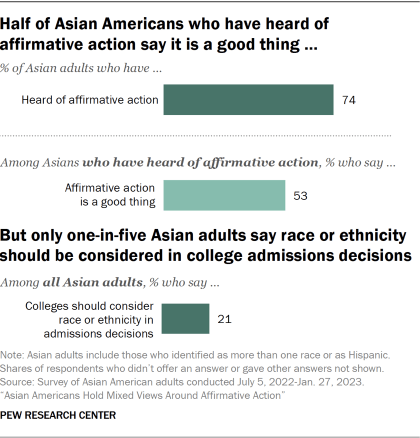
While not all Asian Americans have heard of affirmative action, most have. Nearly three-in-four (74%) say they have heard the phrase before, with awareness varying some across Asian demographic subgroups:
- About eight-in-ten Filipino (83%) and Japanese (82%) adults say they have heard the phrase, compared with only 57% of Vietnamese Americans.
- Meanwhile, 91% of U.S.-born Asians say they have heard the phrase affirmative action, while 67% of Asian immigrants say they have.
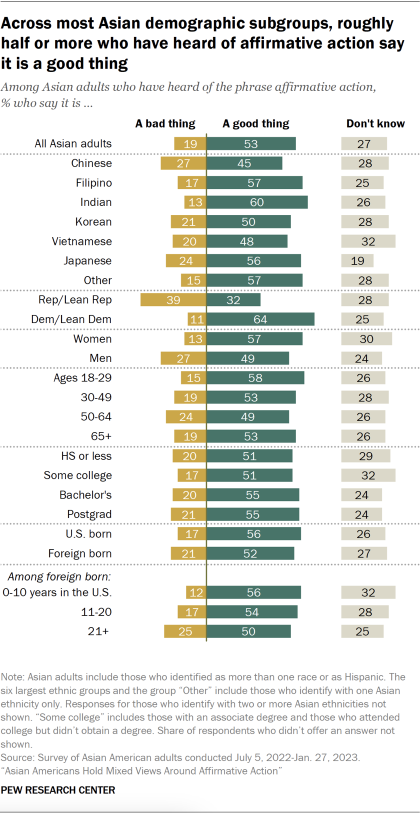
Even if not all Asian adults have heard the phrase affirmative action, support for the general concept among Asian Americans spans education, immigration, age and other demographic subgroups, according to the national survey of 7,006 U.S. Asian adults conducted in six languages between July 5, 2022 and Jan. 27, 2023.
Views about affirmative action among those who have heard the phrase vary slightly across origin groups:
- Indian adults (60%) are more likely than Korean (50%), Vietnamese (48%) and Chinese (45%) adults to say affirmative action is a good thing.
- Chinese adults who have heard of affirmative action are among the least likely to say it is a good thing – 27% of Chinese adults who have heard the phrase say it is a bad thing, and 28% say they don’t know.
Among Asian adults who have heard of affirmative action, views do not vary significantly by nativity, though there are some differences by length of time that immigrants have lived in the United States.
- More than half of those born in the U.S. (56%) and about half of immigrants (52%) say affirmative action is a good thing.
- Among Asian immigrants, 12% of those who have lived in the U.S. for 10 years or less say it is a bad thing, as do 17% of immigrants who have been in the U.S. between 11 and 20 years. Half of Asian immigrants who have lived in the U.S. for 21 years or more say affirmative action is a good thing, while 25% say it is a bad thing. Another 25% say they don’t know if it’s good or bad.
Assessments of affirmative action differ among Asian immigrants by their origins. Chinese immigrants who have heard the phrase (33%) are more likely to say affirmative action is a bad thing than Vietnamese (21%), Korean (21%), Filipino (18%) and Indian (12%) immigrants.
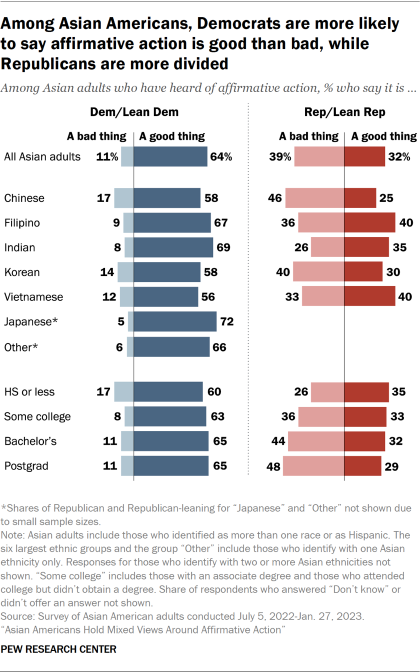
By contrast, there is no significant difference between U.S.-born Chinese adults and other U.S.-born Asians in their views of affirmative action, among those who have heard the phrase. Similar shares say it is a good thing (61% and 55%), as are those who say it is a bad thing (15% and 17%).
Among Asian Americans who have heard of affirmative action, views of it vary by political party affiliation:1
- About two-thirds (64%) of Asians who identify as Democrats or lean toward the Democratic Party say affirmative action is a good thing. By contrast, only 32% of Asian Republicans or Republican leaners say the same.
- While 11% of Asian Democrats say affirmative action is a bad thing, 39% of Asian Republicans say this.
The partisan divide on affirmative action extends to the five largest Asian origin groups – Chinese, Filipino, Indian, Korean and Vietnamese.
- Among Democrats, all major Asian origin groups are more likely to say affirmative action is a good thing than to say it is a bad thing.
- Among Republicans, Chinese adults are more likely to say it is bad than good.
Views of affirmative action among Asian Republicans who have heard of it vary by education level: 48% of Asian Republican adults with a postgraduate degree say affirmative action is bad, as do 44% with a bachelor’s degree, 36% with some college experience and 26% with a high school education or less.
Educational attainment and Asian Americans
Differences in views among Asian adults reflect the demographic diversity of the nation’s Asian population. Among those ages 25 and older in 2019, a higher share of Asian Americans than U.S. adults overall have a bachelor’s degree or higher (54% vs. 33%), according to a Pew Research Center analysis of the 2019 American Community Survey.
However, educational attainment varies significantly by ethnic origin group. Among the six most-populous groups, Indian Americans have the highest share of college degree holders (75%), while Vietnamese Americans (32%) have the lowest share. The share of college degree holders is sometimes even lower among less populous Asian origin groups such as Laotian (18%) or Bhutanese Americans (15%).
Asian Americans are more likely than other groups to enroll in selective colleges and universities. The criteria for admissions at some of these schools is in the spotlight due to a pair of cases before the U.S. Supreme Court.
Students for Fair Admissions (SFFA) argued to the high court that Harvard College, a private university, discriminates against Asian American applicants because they are less likely to be admitted than White, Black and Hispanic applicants with similar qualifications. The group has also sued the University of North Carolina, a public university, over its use of race in college admissions decisions.
Meanwhile, Asian American civil rights organizations such as the Asian American Legal Defense and Education Fund and Asian Americans Advancing Justice (AAJC) have filed briefs in support of race-conscious admissions.2 The court is expected to decide the cases by the end of June 2023.
Majority of Asian Americans say race shouldn’t be a factor in college admissions
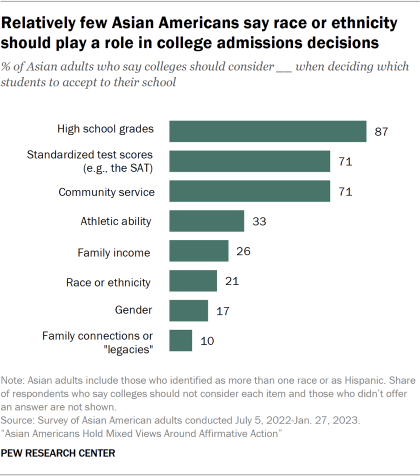
The concept of affirmative action is relatively popular among those familiar with the phrase. But when it comes to college admissions, opinions differ about which factors should be considered when deciding which students to admit to colleges and universities.
Asked about a list of factors that colleges should consider, only 21% of Asian adults say colleges should consider race and ethnicity when deciding which students to accept. By contrast, Asian adults broadly say high school grades (87%), community service (71%) and standardized test scores (71%) should be factors considered in college admissions.
Lower shares say athletic ability (33%), family income (26%) and gender (17%) should be considered. Few Asian adults (10%) say schools should consider family connections or “legacies” in admissions.
Overall, majorities of Asian adults across gender, age, education and origin groups say race or ethnicity should not factor into college admissions. Similar shares of Indian (77%), Chinese (76%), Filipino (76%), Vietnamese (76%), Korean (72%) and Japanese (70%) American adults express this view.
While Asian Republicans and Asian Democrats differ in their views of whether affirmative action is a good or bad thing, majorities of both groups notably say race or ethnicity should not play a role in college admissions. Among Asian Republicans, 90% say race or ethnicity should not be considered, and 69% of Asian Democrats say the same.
Meanwhile, more Asian immigrants (80%) than those who are U.S. born (64%) say race and ethnicity should not be considered in admissions.
Comparisons with other Americans
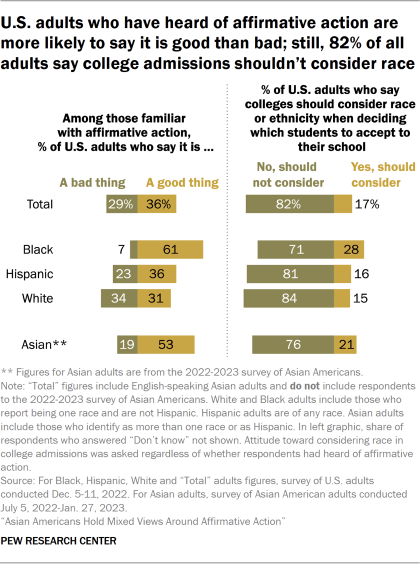
Compared with Asian Americans, U.S. adults overall who have heard of affirmative action are less likely to have a favorable view of it, with 36% saying it is a good thing and 29% saying it is a bad thing in a December 2022 survey. Regardless, only 17% say college admissions should take race into account.
Among racial and ethnic groups, Black Americans are the most likely to say affirmative action is a good thing (61%), while fewer say it is a bad thing (7%). Yet, a much smaller share (28%) of Black adults think colleges should consider race and ethnicity when deciding which students to accept.
Asian adults say considering race and ethnicity in college admissions has mixed impacts in education
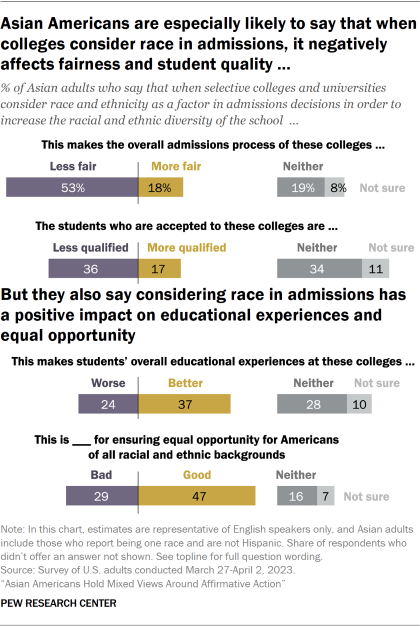
Substantial shares of Asian Americans say that when selective colleges consider race and ethnicity in admissions decisions, it negatively affects fairness and student quality, according to a Center survey of U.S. adults conducted March 27-April 2, 2023, that included a sample of Asian adults interviewed only in English.3
About half (53%) of English-speaking Asians say considering race and ethnicity in admissions would make the admissions process less fair, while 18% say it would make the process more fair. Meanwhile, 36% of English-speaking Asian adults say having race play a role in admissions decisions results in less-qualified students being admitted, compared with 17% who say admitted students would be more qualified.
However, some English-speaking Asians also say affirmative action in college admissions can have a positive impact, according to the March survey. Nearly half (47%) say using race and ethnicity in admissions decisions is good for promoting equal opportunities, compared with 29% who say it is bad. In addition, English-speaking Asians are somewhat more likely to say affirmative action will improve all accepted students’ overall college experience rather than make it worse (37% vs. 24%).
The March survey of U.S. adults also shows that English-speaking Asian adults and Hispanic adults offer mostly mixed assessments of considering race in college admissions. By contrast, Black adults express generally supportive attitudes toward considering race in college admissions, while White adults voice less supportive views.
Asian Americans have differing experiences with efforts to increase racial and ethnic diversity in education and the workplace
When asked about their experiences with efforts to increase diversity in broader settings including education, career or jobs, about one-in-four English-speaking Asian adults (27%) say they have been at a disadvantage due to these efforts, a share similar to that among all U.S. adults (24%).
At the same time, 18% of English-speaking Asian adults say they think they have ever been at an advantage because of efforts to increase racial and ethnicity diversity. The share is similar among Black (20%) and Hispanic adults (15%), but fewer White adults say this (7%).
Some 13% of English-speaking Asian adults say they think people have assumed they benefited unfairly from efforts to increase diversity; a similar share of all U.S. adults (15%) say the same. Meanwhile, a greater share of Hispanic (22%) and Black (28%) adults say they think people have assumed they benefited unfairly from these types of efforts. Among White adults, just 10% say the same.
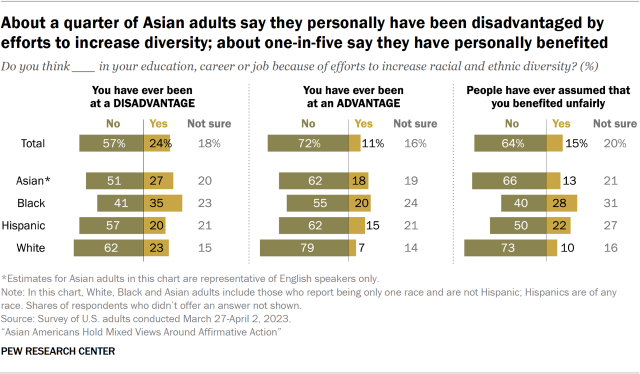
In their own words: Qualitative research findings related to how Asians in the U.S. view affirmative action
In a 2021 Pew Research Center qualitative research study of Asian Americans, focus group participants were asked about their views of affirmative action policies. All participants were given the following description of affirmative action as background before each of the discussions:
“Affirmative action is a legislative approach to increase the representation of women and minorities in areas of employment and education from which they have been historically excluded. In recent decades, some local and state governments have proposed affirmative action policies for racial minorities who are historically underrepresented such as Black Americans, Hispanics and Asian Americans.”
Three types of views emerged from the focus groups: mixed, negative and positive. The following are some examples from these focus group discussions, lightly edited for style and clarity.
Many participants expressed a mixed view of affirmative action. Those who held mixed feelings usually affirmed the concept for its promotion of equality. At the same time, some also questioned how effective affirmative action is in practice.
“Well, I always feel a little mixed about it. I think there are people that cannot advocate for themselves that it probably has helped, but I think it also has hindered those individuals that have either accomplished a lot on their own because people make an assumption that they got helped or that you’re part of a quota. So that part of it, I think, is very difficult. It does diminish a little bit for those that really have done it on their own too. … So I feel really mixed about that, but I think it did open a lot of doors initially. The thought behind it was probably good and noble in some ways, but I’m not sure it’s very effective too.”
–U.S.-born woman of Japanese origin in mid-60s
Other focus group participants said affirmative action hurts Asian Americans in college admissions. Some participants who view affirmative action negatively think it helps Asians less relative to other minority groups, if at all.
“There are very, like, pretty big downsides to it but also it hurts Asians the most because, like, affirmative action stuff, like with college board and SAT scores, they dock us down. It’s not based on merit, it’s based on just affirmative action. They want non-Asians – less Asians in there.”
–U.S.-born man of Laotian origin in mid-20s
Finally, many focus groups participants mentioned affirmative action opening doors for them in the job market, while others said it helps elevate the group’s political representation.
“I think that when we apply for a high-position job, we have to compete for more than the [U.S. born]. If this policy becomes true, Asian Americans, especially women, will have better benefits and it will bring some happiness to us.”
–Immigrant woman of Thai origin in late 30s
“[W]e need a seat at the table. … I mean, even as far as I know, Asian Americans, Filipino Americans have the lowest voter count, and so without having a seat at the table, like how are we going to be heard? So yeah, I mean, I’m down with affirmative action.”
–U.S.-born man of Filipino origin in late 40s
A methodological note: No matter how we asked about topics related to affirmative action, Asian Americans expressed mixed views
How one asks questions in public opinion surveys matters in measuring the public’s attitudes toward issues. In survey research, differences in how questions are framed can substantially affect the answers survey respondents provide.
This report focuses on Asian Americans’ views of affirmative action and race and ethnicity in college admissions. Another accompanying Pew Research Center report focuses on public views of the consideration of race and ethnicity in admissions to selective colleges and universities. Both reports took four broad approaches to understand the public’s range of views on these topics:
- We measured attitudes among those who have heard of affirmative action without any description of the program. In this approach, we first directly asked respondents, “Have you ever heard the phrase ‘affirmative action?’” with no description of affirmative action programs or their goals. We then asked respondents who are aware of affirmative action, “Do you think affirmative action is a good thing, a bad thing or you don’t know?” We asked these questions on two surveys, both of which show similar results for Asian Americans.
On the 2022-23 survey of Asian American adults, 74% had heard of affirmative action, compared with 67% English-speaking Asian adults on the December 2022 survey of U.S. adults. Among those who had heard the phrase “affirmative action,” 53% of Asian adults said it is a good thing and 19% said it is a bad thing on the 2022-23 Asian Americans survey, compared with 42% of English-speaking Asians who said it is a good thing and 27% who said it is a bad thing on the December 2022 U.S. population survey. - We measured attitudes toward criteria for college admissions, including race and ethnicity, without mentioning the term “affirmative action.” After being asked specifically about “affirmative action,” respondents were asked if a series of factors such as high school grades, standardized test scores, athletic ability, family income, gender, and race and ethnicity should be considered when colleges decide which students to accept.
On the 2022-23 survey of Asian American adults, 21% said race or ethnicity should be considered, while 76% said it should not. In the separate December 2022 survey of U.S. adults, 15% of English-speaking Asian Americans said race or ethnicity should be considered, while 85% said it should not. - We measured views toward race and ethnicity as a factor in selective colleges’ admissions for the purpose of increasing the school’s racial and ethnic diversity. We asked respondents whether they approve of such practices but did not mention the term “affirmative action.” This question was asked in a separate Pew Research Center national survey of U.S. adults conducted in March 2023. While 37% of English-speaking Asian adults said they approve of the practice, a higher share (52%) said they disapprove, a result similar to that for all U.S. adults (33% approve and 50% disapprove).
- We assessed views of potential impacts of the practice of using race and ethnicity in selective colleges’ admissions to increase racial and ethnic diversity. Respondents to the March 2023 survey were further asked what impact they think this practice has on fairness of the process, student qualifications, students’ college experiences, and ensuring equal opportunity for Americans of all racial and ethnic backgrounds – again with no reference to the “affirmative action” label.
About half of English-speaking Asian adults said this practice makes the admissions process less fair (53%), while 18% said it makes the process fairer. The share saying this process leads to less-qualified students being admitted (36%) was higher than the share who said it leads to more qualified students (17%). By contrast, more English-speaking Asian adults said it makes all accepted students’ overall college experiences better (37%) than worse (24%), and more said it is good (47%) for ensuring equal opportunity than bad for it (29%).
Across all these approaches, the surveys find Asian American adults hold mixed views about affirmative action and related topics. While about half who have heard of affirmative action say it is a good thing, 76% of Asian adults say colleges should not use race or ethnicity in college admissions decisions.
Another survey of English-speaking Asian adults finds 52% disapprove of using race and ethnicity in selective college admissions to increase racial and ethnic diversity of student bodies. And more say the process is less fair when race and ethnicity is used in selective college admissions (53%) than say it is more fair (18%). Still, English-speaking Asian adults are more likely to say these practices are good for ensuring equal opportunity for all Americans than to say these practices are bad for the same goal (47% vs. 29%).




